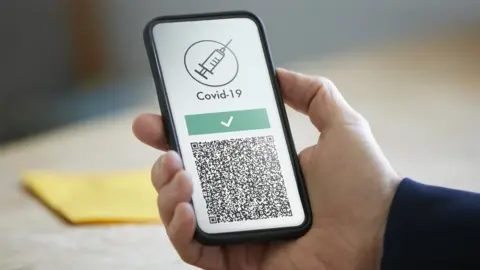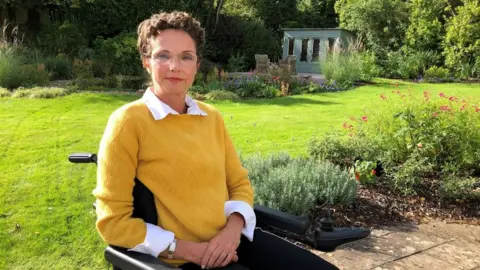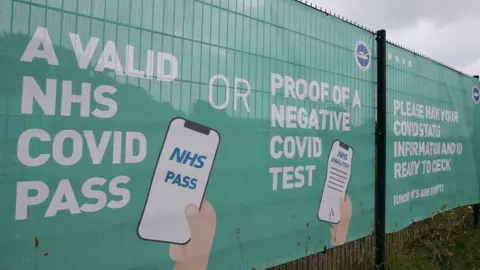Wales NHS Covid pass compulsory for large events and nightclubs
People in Wales now need an NHS Covid pass to be able to legally attend big events or nightclubs.
They are compulsory for over-18s, and show people have either tested negative on a lateral flow test or are fully vaccinated against Covid.
Wales' rugby game against New Zealand on 30 October will be one of the first mass events to require Covid passes.
Some nightclub bosses said they felt "singled out" by the rules, but other people said they felt reassured.
First Minister Mark Drakeford said the new scheme was "vulnerable to abuse" but the "huge bulk of people" will follow the new rules.
 Getty Images
Getty ImagesAsked if people could falsify their lateral flow tests, Mr Drakeford said: "It is vulnerable to people who want to abuse the system but that's why the law is there."
"I am quite sure the huge bulk of people will use the lateral flow test in the correct way," he told ITV's Good Morning Britain programme.
He also rejected claims the new Covid pass was a financial burden for businesses, adding: "Nightclubs already have to check people for their age.
"I don't think the cost issue is a very significant one here."
In its autumn and winter plan Mr Drakeford's government has not ruled out extending the scheme if further action is needed to tackle Covid rates.
He suggested that could include using passes when going to care homes or visiting hospitals.
"If numbers in the community continue to rise... being able to show a Covid pass if you were going into a care home might be an extra defence," he said.
 Getty Images
Getty ImagesWelsh Education Minister Jeremy Miles told BBC Politics Wales that public services were expected to face "significant pressure" this winter, and the pass would cut transmission of the virus.
The Senedd voted on the passes last Tuesday - a vote the Welsh government said will not be repeated, despite it passing by just one vote.
Anyone who is over 16 and has been fully vaccinated in Wales or England, or has had a negative lateral flow test result within the past 48 hours, can get a pass.
They are compulsory for anyone over 18 to enter:
- Nightclubs or similar venues
- Indoor no-seating events with more than 500 people
- Outdoor no-seating events with more than 4,000 people
- Any event with more than 10,000 people, including sport
The Welsh government says any venue that can serve alcohol, is open between midnight and 0500, and where music is provided for dancing will need to check for passes.
That means it could cover other venues not traditionally considered nightclubs which have a late licence.
Venues can either apply the pass rules from when they open their doors, or when they open their dancefloor.
Negative tests will be self-certified but the Welsh government plans to make it illegal to fake a negative test.
Large events could also be allowed to check passes at random, rather than check every person who attends.
How do I get one?
 Getty Images
Getty ImagesThe NHS Covid Pass is available digitally but you need to register for an NHS login via the website.
You need to upload a photo of your ID. That can be a passport, full UK driving licence or full European driving licence.
This allows you to produce a Covid pass using a smart phone, computer or laptop.
Your NHS Covid Pass includes a barcode. The expiry date refers to the barcode and will update automatically. It does not apply to your vaccination status.
In Wales, you cannot get the pass via the NHS app, as this is only valid in England.
 Getty Images
Getty ImagesWales is not the first nation to introduce such a pass.
In France, people have had to prove they are fully vaccinated, have recently tested negative or recently recovered from Covid with a "health pass". That must be produced on entering cafes, restaurants or public transport.
Scotland is the only other UK nation to use them after they were introduced on 1 October.
Is everyone happy about it?

One nightclub and bar in Denbighshire has decided to close earlier in the evening rather than dealing with the "complexity" of implementing Covid passes.
Mike Murray, manager of Bar 236 in Prestatyn, said the club used to stay open past midnight with live music and DJs, but would need extra staffing to police the system, and it was not worth it financially.
"We always weighed up the situation, following the government guidelines to make it a safe and comfortable environment to drink in.
 Google maps
Google maps"We've even been keeping masks on and doing table service after the government advice changed because what's wrong with doing it a little longer to keep people comfortable?"
He added he received a lack of guidance from Welsh government as to "what passes would look like or where we could get one from if people asked".
"We want people to come in and let common sense prevail: If you're unwell, don't come to the bar."

The decision to introduce Covid passes has very much split opinion, which was evident in the Senedd vote.
Guto Brychan, chief executive of Cardiff music venue Clwb Ifor Bach, said the timing made things difficult as students had just returned to university and it is "the busiest time of year".
He said this was made more difficult because many students are from outside Wales and may not understand the law.
Mr Brychan said: "One of the main concerns as well is that the Covid pass isn't uniform across the whole of the hospitality industry.
"It seems to have been specifically designed to target places that supply dancing or culture, but I'd argue the high risk activity here is the consumption of alcohol, not dancing.
"There'll be plenty of venues open as late as ourselves that will have as many people in them but won't have the restrictions that we have in place."

Lidi Staffurth is one of thousands of people who have been shielding during the pandemic due to a condition which makes them extremely vulnerable to Covid-19.
She said Covid passes would help reassure people who might feel uncertain about attending large events, adding she felt she had her "freedom back".
Ms Staffurth labelled it a "brilliant idea", not least because there are three young people in her family.
"If they're in large groups then we'll know they're around people who are double vaccinated, or at least free from Covid," she said.
"I think it's a fantastic idea and for a society at large it means people are looking after each other.
"I think some young people just don't care - they've had it with Covid, and I think we've all had it with Covid - but they live in their own little bubble and they don't really see beyond that bubble a lot.
"And that's fair enough, but it means with a Covid pass they're made to consider that."
David Chapman, executive director for UK Hospitality in Wales, called for "tolerance" from government, licencing authorities and the public as the passes were introduced.
He told BBC Radio Wales Breakfast there was some "trepidation" in the industry, particularly about alignment with England, as well as staff shortages.
"We've got staffing problems as people will know already and more labour intensive moves such as this actually makes it quite difficult for a business to juggle resources well at the moment," he said.
He also called for the "easiest possible trading conditions" over Christmas, saying businesses had been told passes would stop "stop at a certain point when society and the health service can cope".
 Getty Images
Getty ImagesDr Mair Hopkin, chairwoman of the Royal College of General Practitioners in Wales, said the risk of Covid will increase as the weather gets worse and people spend more time indoors.
She said: "They've introduced them in France and it seems to have been very acceptable to the French population, and also it seems to have coincided with a more rapid drop in their incidence rates.
"If that happens here then that would be a good thing."
Economy Minister Vaughan Gething said he would not "expect perfection on day one" as the system is introduced.
He said: "We do accept there may be problems in venues getting used to what they need to do."
